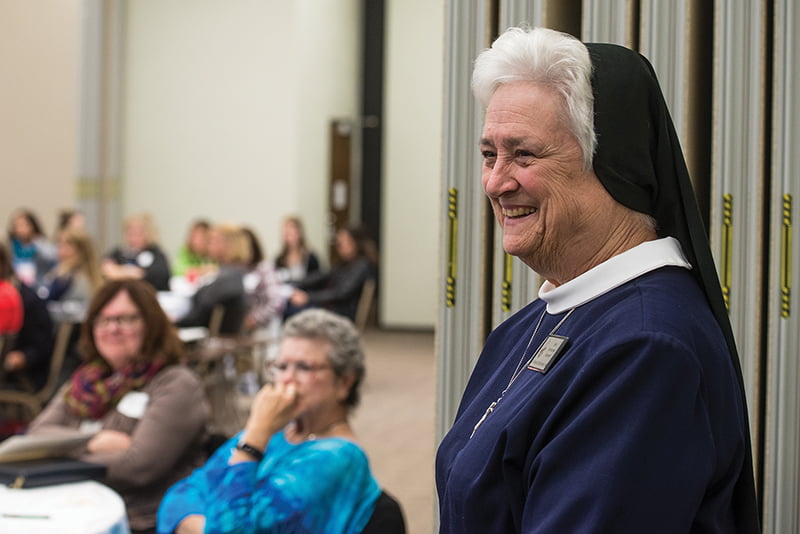
Sister Pat McCormack, IHM, director of the Immaculate Heart of Mary Office of Formation and Support for Parents and Teachers, was the keynote speaker at a one-day workshop, entitled “Accompaniment: Join the Journey,” held on Nov. 6 at Savior Pastoral Center in Kansas City, Kansas. LEAVEN PHOTO BY JOE MCSORLEY
by Joe Bollig
joe.bollig@theleaven.org
KANSAS CITY, Kan. — Pope Francis’ call for the church to reach out to the peripheries was the theme and inspiration for a one-day workshop, entitled “Accompaniment: Join the Journey,” held on Nov. 6 at Savior Pastoral Center here.
The workshop drew 98 attendees, who were directors of religious education, catechists, Catholic schoolteachers, Catholic school administrators and parents.
The goal of the workshop was to provide effective catechesis for all children — but especially those who have disabilities, challenges and difficulties.
“Today is about trying to . . . reach the peripheries, reaching our children in new and different kinds of ways, learning about new strategies and levels of support, and reaching our parents who are sometimes overwhelmed and are doing the best they can,” said Tom Racunas, lead consultant for the special-needs ministry of the Archdiocese of Kansas City in Kansas.
The workshop was jointly sponsored by Perfect Wings, the special- needs ministry and the children’s catechesis office of the Archdiocese of Kansas City in Kansas.
The cost of the day was underwritten by the Knights of Columbus Charities Aid Foundation.
The morning keynote speaker was veteran educator Sister Pat McCormack, IHM, director of the Immaculate Heart of Mary Office of Formation and Support for Parents and Teachers. She is the author of eight books. The title of her address was: “Be the ‘I’ in Accompaniment.”
“What is the ‘I’? The ‘I’ is taking Jesus at his word,” said Sister Pat. “According to Mathew’s Gospel, the last words spoken by Jesus on this earth were: ‘Go out into the whole world and baptize in the name of the Father and the Son and the Holy Spirit, and know that I am with you to the end.’”
“As long as we keep remembering who we are and whose we are, we’re in good shape,” she said. “It’s when I forget whose I am and start to take it all on my shoulders is when it falls apart.
“Because my shoulders aren’t broad enough to carry the cross.”
According to St. John Paul II, we all need to be missionaries. That includes, she said, being missionaries to those who are already baptized and lack a personal experience of Christ.
He called this the “new evangelization.”
“Accompaniment can occur right in your own CCD classroom,” said Sister Pat. “We are called to walk with people, accompany people, meet them where they are and create opportunities for them to meet Christ experientially.”
She called upon the parents, educators and administrators not to focus on what they can’t do, but what they can do.
Drawing on her background as an educator, Sister Pat organized her approach to accompaniment according to the ABCs: Accentuate Gospel values, Build bridges to evangelization and Create a culture of community.
Accentuating Gospel values involves the physical and psychological environment. Is the Gospel evident? It should be.
“In your classroom [or catechetical setting],” she asked participants, “does everything have a purpose in your room — and is that purpose to bring people in that room, whatever their ages are, to come to know themselves better and love their God more?”
Building bridges involves the “B’s”: Be who you say you are, be the “I” in evangelization, be reasonable and responsible versus being reactionary, be disciplined — maintain boundaries, keep confidences and avoid gossip.
Creating a culture of community requires that teachers and catechists model the Gospel values of justice, redemption, restitution and reconciliation and nurture a spirit of communion.
“Very quickly and very briefly,” she explained, nurturing a spirit of communion means that we “find Christ in each other or bring Christ to the situation.”
“Think of others as an extension of [yourself],” she said.
Love is an action — it is a choice, she continued. The Gospel calls for us to love.
Sister Pat ended by contrasting two words, representing two mindsets, that are identical except for the substitution of a letter: bitter and better.
“[Bitter] is all about ‘I’ . . . me, myself and I,” she said. “When it’s all about ‘I,’ I become a bitter person. And who wants to be around a bitter person?
“I’m the one who makes the choice to be bitter or better. When I put my thought into effort, energy, enthusiasm, evangelization, I’m a better person, I’m a happier person, you and I engage better, and life goes on.”
“We make the difference,” she concluded. “No one makes us bitter; no one makes us better. God made us good, and we make choices that follow through on that.”






